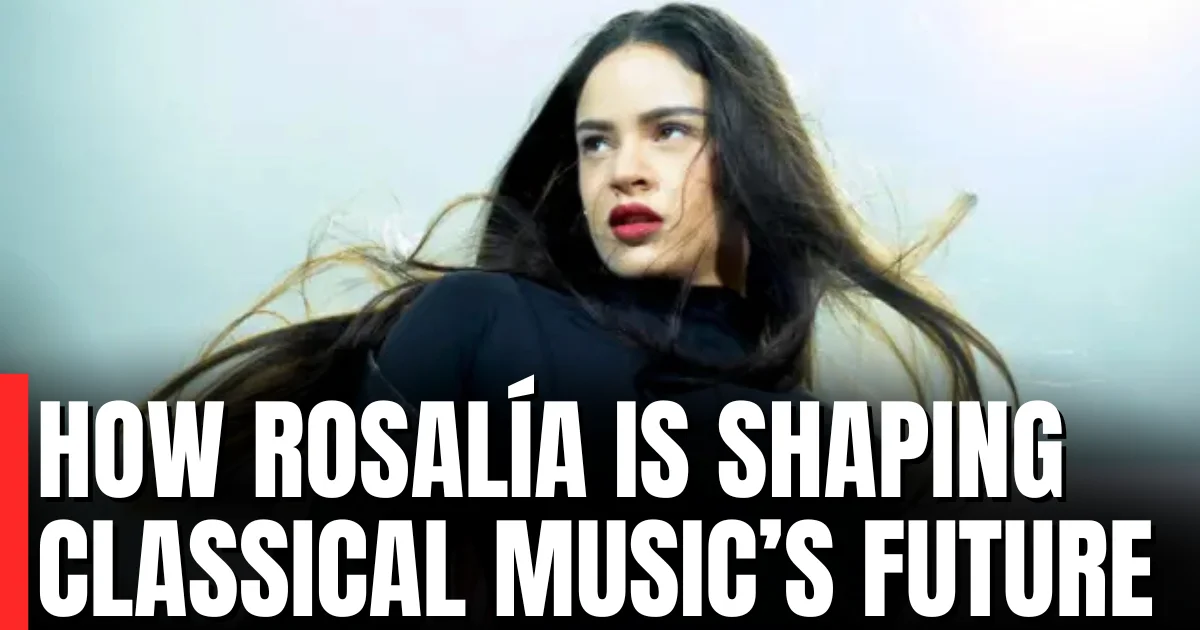Spanish superstar Rosalía is inspiring young classical musicians with her flamenco fusion artistry. Discover how she’s shaping music’s future. Read more now.
Table of Contents
Rosalía Is Inspiring an Entire New Generation to Embrace Classical Music Traditions
A global pop superstar is accomplishing something unexpected: drawing young people toward classical music traditions. Rosalía, the Spanish sensation known for blending flamenco with contemporary sounds, has become an unlikely ambassador inspiring the next generation to explore classical roots with fresh enthusiasm.
The Rosalía Effect on Young Musicians
Something remarkable is happening in music schools and conservatories. Young students are citing Rosalía as their inspiration for pursuing classical training.
The Grammy-winning artist has demonstrated that traditional musical foundations can fuel modern success. Her deep flamenco training undergirds everything she creates, showing students that classical discipline pays dividends.
Music educators report increased interest in classical guitar, voice training, and traditional Spanish music forms. They trace this surge directly to Rosalía’s global visibility.
Who Is Rosalía?
For American audiences still discovering her artistry, Rosalía represents a unique musical phenomenon. Her background defies easy categorization.
Rosalía’s musical journey:
| Milestone | Significance |
|---|---|
| Classical training | Studied flamenco at prestigious Catalonia music school |
| Breakthrough album | “El Mal Querer” merged tradition with innovation |
| Grammy success | Multiple Latin Grammy and Grammy Award wins |
| Global collaborations | Worked with major American artists |
| Cultural impact | Brought Spanish traditions to worldwide audiences |
Born Rosalía Vila Tobella in Spain, she spent years studying traditional flamenco before launching her pop career. That foundation shapes everything she produces.
Her music videos showcase classical techniques alongside cutting-edge production. Young viewers see traditional artistry presented as undeniably cool.
Classical Training Meets Modern Stardom
Rosalía’s success story offers a powerful lesson about classical music’s relevance. Her traditional training didn’t limit her commercial appeal—it enhanced it.
How classical foundations fuel her success:
- Vocal technique — Flamenco training provides distinctive power and control
- Rhythmic complexity — Classical understanding enables intricate compositions
- Cultural depth — Traditional knowledge adds authentic substance
- Technical skill — Years of practice created exceptional abilities
- Artistic credibility — Serious training earns industry respect
Young musicians observing her career recognize this connection. They see classical training not as outdated obligation but as pathway to contemporary success.
This reframing represents a significant shift in how young people perceive traditional music education.
Music Schools Report Increased Interest
Educators across multiple countries report tangible Rosalía effects on enrollment and interest. Students arrive mentioning her as inspiration.
Educational impacts include:
- Rising enrollment in flamenco guitar programs
- Increased interest in Spanish classical traditions
- Students seeking voice training emphasizing technique
- Greater curiosity about music history and theory
- Willingness to commit to demanding practice schedules
Conservatory directors describe students who previously showed little classical interest now embracing rigorous training. They credit Rosalía with making tradition seem relevant.
This enthusiasm extends beyond Spanish music specifically. Students inspired by Rosalía often explore broader classical traditions once engaged.
Bridging Generational Musical Divides
Rosalía accomplishes something rare: connecting young listeners with older musical traditions without seeming dated or preachy. Her approach feels organic.
Her bridging techniques include:
| Approach | Effect |
|---|---|
| Modern production | Traditional elements wrapped in contemporary sounds |
| Visual style | Cutting-edge aesthetics make classical elements appealing |
| Collaborations | Working with popular artists expands audience |
| Social media presence | Platform mastery keeps her culturally current |
| Authentic passion | Genuine love for traditions communicates sincerely |
Older musicians who feared classical forms were dying find hope in her success. Younger audiences discover depth they didn’t know existed in traditional music.
This bridging function may prove her most lasting contribution beyond her own recordings.
The Flamenco Renaissance Connection
Rosalía’s influence connects to broader flamenco revival occurring globally. Interest in this classical Spanish art form has surged significantly.
Flamenco renaissance indicators:
- Dance school enrollments increasing worldwide
- Guitar makers reporting higher demand for flamenco instruments
- Streaming numbers for traditional flamenco artists rising
- Festival attendance growing across multiple countries
- Academic programs expanding flamenco offerings
While Rosalía didn’t single-handedly create this revival, she dramatically accelerated it. Her visibility introduced flamenco to audiences who might never have encountered it otherwise.
Young Americans now seek out flamenco performances and lessons. Many trace their initial interest directly to discovering Rosalía’s music.
American Music Education Implications
Rosalía’s influence carries specific implications for American music education. Schools and programs are adapting to student interests she’s sparked.
US educational responses include:
- More programs incorporating world music traditions
- Classical guitar programs emphasizing diverse styles
- Voice training expanding beyond Western classical techniques
- Greater emphasis on rhythm and percussion skills
- Cultural context receiving increased attention
American students increasingly reject narrow definitions of classical music. They want training that encompasses global traditions including flamenco.
Forward-thinking institutions are responding to these preferences. Those that don’t risk losing students to more adaptable programs.
Critics and Traditionalists Respond
Not everyone celebrates Rosalía’s classical music influence. Some traditionalists express concerns about her fusion approach.
Criticisms include:
- Concerns about diluting pure flamenco traditions
- Questions about commercializing sacred art forms
- Debates over authenticity in fusion contexts
- Worries that students want shortcuts rather than discipline
- Arguments that popularity shouldn’t define artistic value
Rosalía herself has addressed such concerns respectfully. She emphasizes her deep training and genuine reverence for traditions she draws upon.
Supporters counter that any pathway bringing young people to classical training deserves celebration. Purist gatekeeping may ultimately harm traditions more than fusion approaches.
The Streaming Generation Discovers Tradition
Rosalía’s influence operates primarily through platforms young people actually use. Her streaming success and social media presence meet students where they are.
Platform presence statistics:
- Billions of streams across major platforms
- Millions of social media followers worldwide
- Music videos achieving massive YouTube viewership
- TikTok presence influencing youngest listeners
- Spotify algorithm recommendations spreading her influence
Young people discover her through algorithms, then explore her influences. This digital pathway to classical discovery didn’t exist for previous generations.
The journey from pop playlist to classical interest happens naturally for many young listeners. Rosalía serves as bridge they didn’t know they needed.
What This Means for Classical Music’s Future
Rosalía’s influence offers hope for classical music traditions facing audience challenges. Her success suggests pathways forward.
Implications for classical music include:
- Popular artists can drive interest in traditional training
- Fusion approaches may attract rather than repel new audiences
- Digital platforms offer discovery opportunities
- Young people respond to authentic passion for tradition
- Classical relevance requires contemporary presentation
The classical music world has long struggled to attract young audiences. Rosalía demonstrates that connection is possible when approach adapts appropriately.
Her influence won’t solve all challenges facing classical traditions. However, she’s proven that young people can embrace demanding musical training when properly inspired.
FAQs
How is Rosalía connected to classical music?
Rosalía trained extensively in flamenco, a classical Spanish musical tradition, at a prestigious conservatory in Catalonia. This rigorous classical foundation shapes her contemporary work, blending traditional techniques with modern production styles that have earned Grammy recognition.
Why are young people interested in classical music because of Rosalía?
Young listeners see Rosalía’s success and recognize that her classical training underlies her artistry. She makes traditional music seem relevant and cool rather than outdated. Students now pursue classical training hoping to develop similar foundational skills.
What is flamenco and how does it relate to classical music?
Flamenco is a traditional Spanish art form encompassing music, dance, and singing with roots dating back centuries. It requires extensive training similar to other classical traditions. Rosalía studied flamenco formally before incorporating elements into her contemporary work.
Are music schools actually seeing increased enrollment because of Rosalía?
Yes, music educators in multiple countries report increased interest in flamenco guitar, classical voice training, and Spanish musical traditions. Many students specifically cite Rosalía as their inspiration for pursuing traditional music education.
Can popular music actually help preserve classical traditions?
Evidence suggests popular artists like Rosalía can introduce classical traditions to new audiences who then explore further. While some traditionalists worry about dilution, increased interest generally benefits preservation by attracting new students and audiences to traditional art forms.
Conclusion
Rosalía has achieved something remarkable beyond her chart success and Grammy awards. She’s inspiring a new generation to embrace classical music traditions they might otherwise have ignored.
Young musicians now see classical training as pathway to contemporary success rather than outdated requirement. Music schools report tangible increases in student interest directly attributed to her influence.
The Spanish superstar proves that tradition and innovation can coexist beautifully, inspiring countless young artists to explore their own classical roots.
Follow our arts and culture coverage for more inspiring stories. Share your thoughts on Rosalía’s influence in the comments below.

